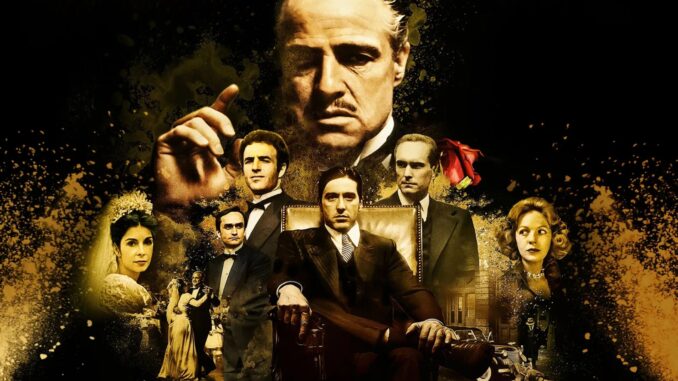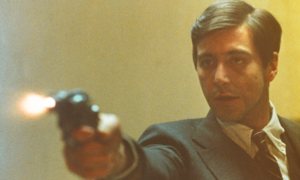
‘The Godfather’ : After 50 Years, It’s Still a Movie You Can’t Refuse

As part of Collider’s “retro review” series, I’ve been fortunate enough to watch and review Penny Marshall’s heartfelt tear-jerker A League of Their Own and Alfred Hitchcock’s suspenseful masterpiece Psycho, two very different, but very important films for any lover and admirer of cinema. But the title that inevitably rises to the top of all movie conversations is, of course, The Godfather. Usually, it involves someone’s often cringe-worthy attempt at an impression of Vito Corleone saying those famous words: “I’m gonna make him an offer he can’t refuse.” (If only there was a way we could refuse to hear these impressions.) While that line of dialogue has been overstated, praise for the 1972 crime drama certainly has not.
Before we even dive into the meaty story and character development (or lack thereof), it’s important to take note of just how impressive the cast of The Godfather is. Marlon Brando, James Caan, Diane Keaton, Robert Duvall, andAl Pacino? It doesn’t get much better than that. There was a special magic that was conjured up here that many subsequent ensemble films have tried—and failed—to replicate. Perhaps it’s because the screen time for each actor and their respective characters felt exactly right. Francis Ford Coppola, the esteemed director and co-writer with the source material’s author Mario Puzo, didn’t fall into the trap of trying to cram everyone’s storylines down the audience’s throat before the credits roll. Maybe it’s because he gave himself ample time to do so. The picture clocks in at a whopping 2 hr and 55 min, which is arguably more than enough time to tell this story. And, considering it was followed up with two sequels (one of which exceeded this indulgent runtime), the almost three-hour time stamp feels a smidge excessive.

Nevertheless, The Godfather never drags, which is a massive storytelling feat for any project, no matter the scope. At the helm of this deadly ship is Marlon Brando as Vito Corleone, the titular Godfather who turns a benign activity such as petting a cat into one of the most terrifying things you ever did see. He’s an aging, respected (but mostly feared) Sicilian crime boss of the very connected Corleone family in 1945 New York City. If you need something, shall we say, “taken care of,” then Vito is the man you call. There’s no guarantee he will answer, but you will without a doubt know if he does. With the help of his character’s iconic look and sound, Brando becomes the embodiment of intimidation. He takes his time talking (mostly because he knows that whoever sits before him has no choice but to listen) and stealthily reminds his prey when and how they have let him down. This is effortlessly executed in the opening scene after he hears out the demanding request of a family friend. “I can’t remember the last time you invited me to your house for a cup of coffee,” Vito says while stroking his feline companion. “But let’s be frank here. You never wanted my friendship. And you were afraid to be in my debt.”
While this is often credited with being Brando’s movie, it’s his onscreen sons that are electric. James Caan plays Sonny, the stubborn hot head psychologically burdened by being the oldest. He toes the line his father so firmly established to the best of his ability, though his temper and ego often get the better of him. And when it does, Vito is sure to let him know, promptly shoving him back into his subordinate place. Sonny’s hypocritical behavior is maddening; one minute he is beating Carlo (Gianni Russo) for abusing his sister, Connie (Talia Shire), the next he is cheating on and beating his own wife without giving it a second thought. Misogyny and racism run rampant in the Corleone family, and Sonny is one of the worst offenders.
Robert Duvall delivers an understated—but highly effective—performance as Tom Hagen, the consigliere and unofficial adopted son of Vito. Basically, he tells Vito who wants to see him and why, which helps the boss decide whether or not any of these meetings are worth his time at all. As consigliere, he also serves as Vito’s errand boy. His even, non-threatening, borderline robotic temperament makes his visits to the people that Vito is trying to persuade all the more powerful. When he meets with Hollywood executive Jack Woltz (John Marley) to ask him to give Vito’s godson Johnny Fontane (Al Martino) a role in his new movie, Jack gets hostile rather quickly, slinging racial slurs to his face with no end in sight. But rather than returning the favor, Tom keeps his cool, puts out his hand for a shake, and before leaving says, “By the way, I admire your pictures very much.” This out-of-place and subdued compliment was the secret weapon that convinced Jack to take a meeting with Tom after all.
The buffoonish middle son Fredo (John Cazale) provides a bit of comic relief. He’s not exactly loyal and is certainly not a leader, an overall stark contrast to Sonny and Tom. But no one is more of a black sheep than the youngest son Michael, who is played with precision by Al Pacino. When we first meet him, he wants nothing to do with his father’s shady business, and the family knows it. He’s a former Marine with an innocent demeanor and a queasy feeling about his father’s reputation. He tries to shield his doe-eyed girlfriend Kay (Diane Keaton) from the brutal reality, but is forced to catch her up to speed on who’s who while they attend his sister’s wedding. Michael’s reluctance is palpable, though, as he’s ashamed of his criminal bloodline. This is clear after he clumsily tries to change the subject from his family to something they are all equally passionate about: food. After explaining Tom’s odd origin story, he says with a child-like smile, “You like your lasagna?”
Pacino’s disturbing metamorphosis is the irregular heartbeat of The Godfather. He goes from being the literal laughingstock of his siblings to the one who calls the shots. What makes his moral descent so believable and scary is how slow said descent actually is. It’s a series of events and tasks that build on each other, subconsciously stroking his ego and beefing up his confidence. Michael whispering, “Just lie here, Pop. I’ll take care of you now. I’m with you now,” to his bedridden father is probably the most blatant indication that his character was starting to shed his skin, but the nonverbal moments are much more powerful. The way he lit a cigarette with ease for Enzo following the potentially-deadly situation in front of the hospital highlighted Michael’s growing coolness under pressure. In other words, his transformation was earned.
To everyone’s surprise, Michael also shows interest in and takes charge of orchestrating a meeting between him, drug lord and rival Sollozzo (Al Lettieri), and Captain McCluskey (Sterling Hayden), a crooked cop under Sollozzo. If all went according to plan, Michael would be the only one leaving the meeting alive. This proposition is met with laughs by his brothers (particularly Sonny) who all think it’s pretty darn cute that their little brother thinks he can be a family asset. Rather than being discouraged by this mockery, he puts his money where his mouth is and takes the necessary steps to prepare for this public meeting. First order of his business for Michael? Learning how to shoot a gun, something that is as second nature to his siblings as tying a shoe. Pacino’s performance in this scene was particularly potent and revealing for his character. Watching him try to properly hold a gun was like watching a Little Leaguer learn how to grip a baseball bat. But, once he pulls the trigger and got over how loud a gunshot is, he knew he was going to knock the meeting out of the park.
Though some moments in the second half of the film are a bit predictable, there are more than enough plot developments and twists that keep the narrative’s energy and tension. Sonny’s untimely demise at the toll booth, though somewhat expected, is a startling reminder that no one in this line of work is safe. Michael’s reunion with and eventual marriage to Kay after becoming fully invested in this corrupt world is an unsettling full-circle storyline. Vito’s tearful response to hearing that his son died adds a much-needed layer of humanity to the emotion-averse mobster, especially since he shamed a man for crying in the beginning of the film. That, coupled with Vito’s death while playing with his grandson in the tomato garden, is weirdly poetic.
The entire movie neatly tees up to that final scene, where Michael inevitably becomes his father’s son. He dismisses his sister as “hysterical” when she breaks down in tears over the murder of her husband and callously says, “Don’t ask me about my business, Kay” to his concerned wife. The final nail in the coffin comes when he’s referred to as “Don Corleone,” an esteemed title in the mafia world formerly held by his father. The Oscar winning crime drama paints a compelling portrait of how greed, ego, and loyalty can corrupt even the most unassuming individual. The Godfather is simply a movie you can’t refuse.
